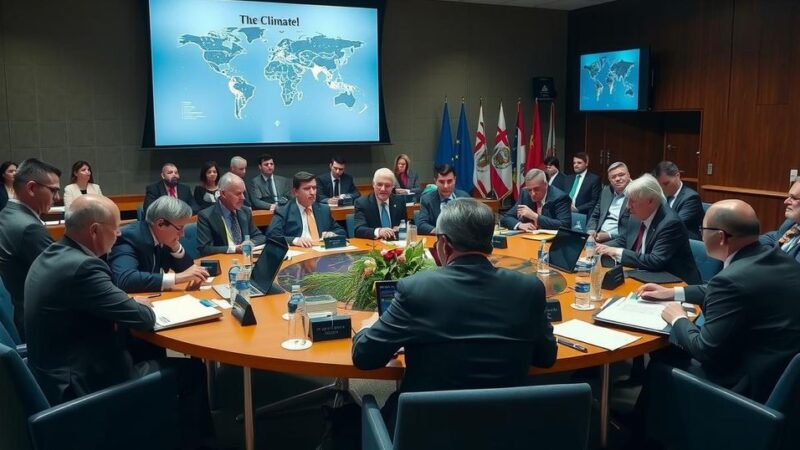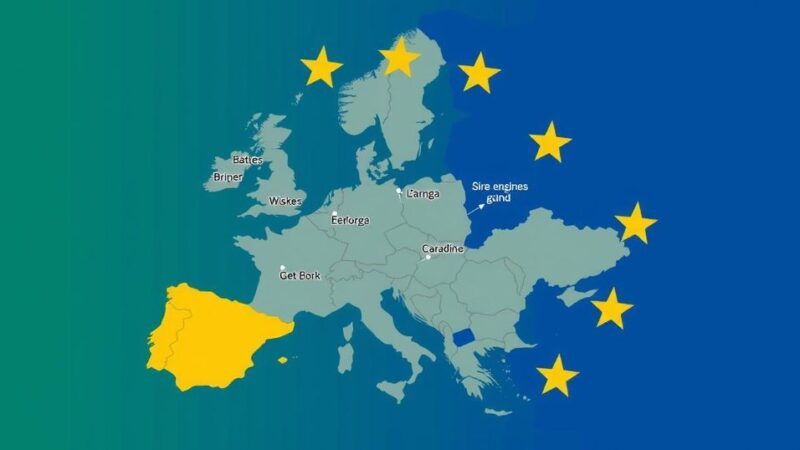The sixth Climate and Security Conference at the Federal Foreign Office emphasizes the profound linkage between the climate crisis and security, addressing increasing resource scarcity as an existential threat to nations. Participants aim to devise actionable solutions to ensure peace amidst escalating climate challenges, with critical discussions centered on the role of the security sector, climate risk analysis, and tools such as the Climate Conflict Vulnerability Index. The conference serves as a prelude to important discussions planned for COP29 in Baku.
The climate crisis has emerged as the paramount security policy challenge facing the global community today, as highlighted in the sixth Climate and Security Conference held at the Federal Foreign Office in Berlin. This conference emphasizes the profound connection between climate change and national security, underscoring how the degradation of vital resources—such as water and arable land—has rendered them increasingly scarce, thus posing existential threats to millions. The conference positions itself as the leading global platform for exploring the intricate nexus between climate change, peace, and security. As climate extremes escalate human suffering and trigger displacement and resource conflicts, they contribute to heightened human insecurity, threatening regional peace and international stability. Promoting an understanding that climate policy inherently encompasses security considerations, the conference successfully established itself as a critical forum since its inception in 2019. Under the theme “How to Secure a Climate for Peace,” approximately 250 participants from diverse backgrounds, including representatives from vulnerable nations, the United Nations, academia, and civil society, convene to devise actionable solutions. The dialogue aims to support fragile, conflict-affected nations in meeting the 1.5-degree Celsius target established by the Paris Agreement, which is particularly relevant as the world gears up for the upcoming UN Climate Change Conference (COP29) scheduled for November in Baku. This year’s discussions prioritize the interplay between the climate crisis and security objectives, with an exploration of how security and defense sectors can contribute. Innovative methodologies for climate risk assessment and early warning systems aimed at promoting peace and stability in vulnerable regions are also on the agenda. An important tool discussed is the Climate Conflict Vulnerability Index (CCVI), developed collaboratively by the Federal Foreign Office, Potsdam Institute for Climate Impact Research, and Bundeswehr University Munich. The CCVI utilizes publicly accessible data regarding climate risks and vulnerabilities to illuminate the relationships among climate, security, and peace.
The sixth Climate and Security Conference convened by the Federal Foreign Office in Berlin serves as a pivotal meeting point for addressing the intersection of climate change and security policy. This gathering underscores the increasing urgency of the climate crisis as a significant factor destabilizing regions and exacerbating conflicts, which has sparked international dialogue since the conference series began in 2019. Given the growing recognition of environmental challenges as core security issues, this year’s conference seeks practical methods to enhance peace and security through improved climate risk understanding and mitigation efforts.
In conclusion, the sixth Climate and Security Conference serves as a vital forum for discussing the critical links between climate change and global security. By bringing together key stakeholders and focusing on innovative solutions, it aims to enhance understanding and response strategies to ensure peace in an increasingly unstable climate landscape. Furthermore, the insights gathered will be instrumental in supporting vulnerable countries as they navigate the climate crisis and strive to meet important sustainability targets.
Original Source: www.auswaertiges-amt.de





